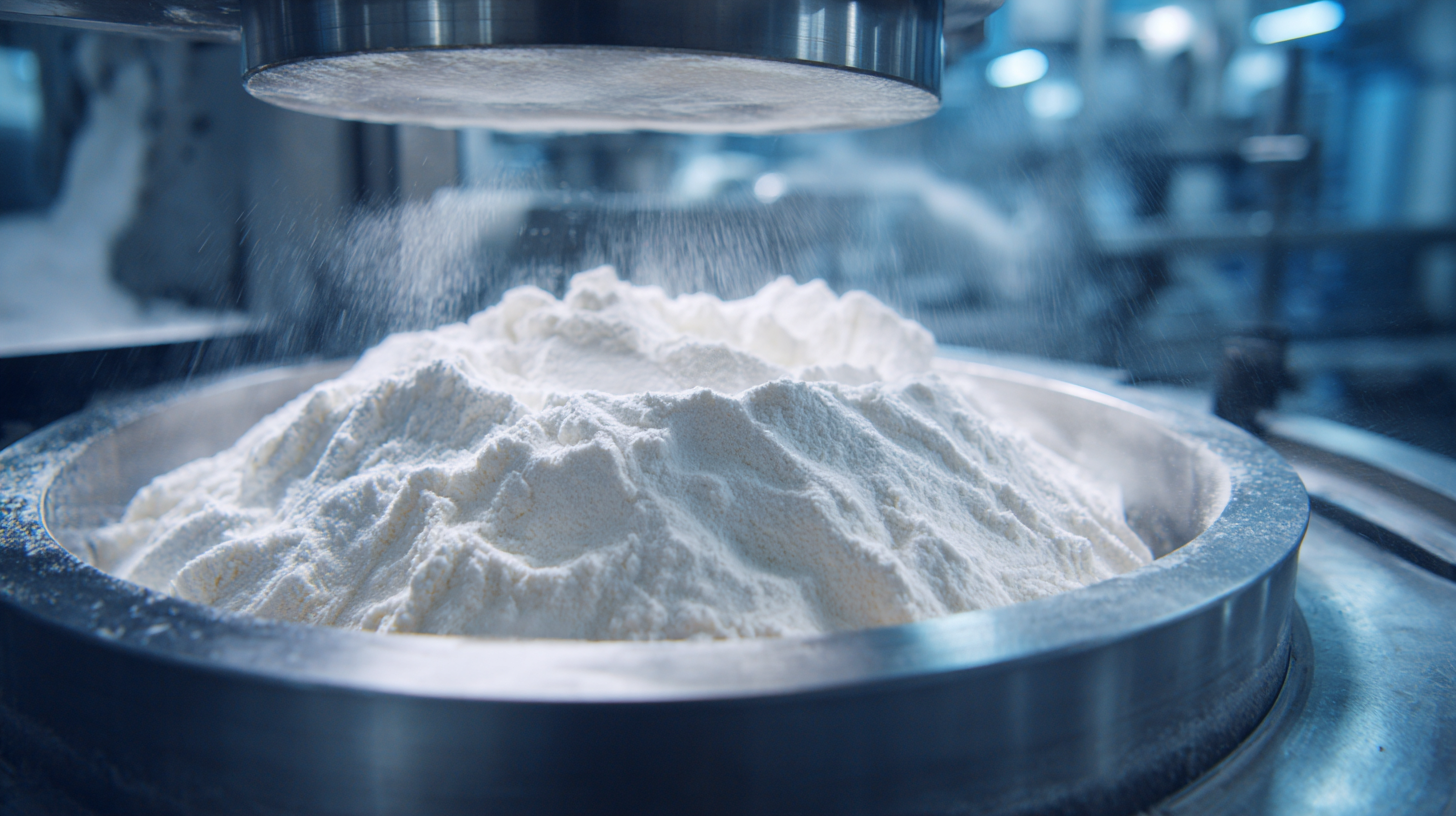50% Response rate
Futureproofing Manufacturing Strategies in 2025 with the Best Powder Manufacturer
As the manufacturing landscape evolves, futureproofing strategies become essential for staying competitive in 2025 and beyond. A recent report by Smithers Pira indicates that the global market for powders is projected to reach $160 billion by 2025, driven by advancements in technology and increasing demand across various industries, including pharmaceuticals, food processing, and advanced materials. Partnering with a reputable Powder Manufacturer can significantly enhance operational efficiency and quality, ensuring businesses not only meet current market needs but also adapt to future challenges. By leveraging innovations in powder technology and production processes, manufacturers can optimize their supply chains and position themselves for sustained growth within an increasingly dynamic market.

Challenges in Current Manufacturing Processes and Their Impact
As we look ahead to 2025, the manufacturing sector faces numerous challenges that threaten efficiency and productivity. One primary issue is the reliance on outdated processes that struggle to keep up with technological advancements. Many manufacturers continue to operate on legacy systems, resulting in inefficiencies that hinder their ability to adapt to changing market demands. This stagnation not only affects output quality but also increases operational costs, making it imperative for companies to evaluate their current manufacturing strategies.
Another significant challenge lies in the supply chain disruptions that have become commonplace due to global uncertainties. These disruptions can lead to material shortages, delays, and increased prices, forcing manufacturers to seek more resilient solutions. Partnering with the best powder manufacturer can provide a viable path forward. By leveraging advanced materials and optimized production processes, manufacturers can enhance their agility and reduce dependency on volatile supply chains. Embracing innovative solutions will be essential for overcoming current hurdles and ensuring long-term success in the evolving landscape of manufacturing.

Identifying Key Problems Faced by Powder Manufacturers Today
In the rapidly evolving landscape of manufacturing, powder manufacturers face a multitude of challenges that threaten their efficiency and competitiveness. One of the key problems lies in the reliance on outdated technologies, which can hinder production rates and lead to inconsistent product quality. As manufacturers strive to meet growing demand, they must adopt advanced processes, such as automation and real-time data analytics, to enhance operational effectiveness and ensure consistent output.
Another significant issue is the increasing need for sustainable practices. Environmental regulations are becoming more stringent, compelling powder manufacturers to rethink their production methods. This shift requires investment in green technologies and sustainable sourcing of raw materials. By addressing these key problems, powder manufacturers can not only comply with regulatory standards but also appeal to a more eco-conscious consumer base. Emphasizing sustainability alongside technological advancement will be crucial for staying relevant in the market as we approach 2025.
Innovative Solutions to Combat Common Manufacturing Issues
The manufacturing industry faces numerous challenges, including the pressing need for sustainability and efficiency. Innovative solutions are essential to address common manufacturing issues while aligning with environmental goals. With emerging trends in sustainable building materials and industrial wastewater management, manufacturers can adopt greener practices that not only mitigate risks associated with sustainability challenges but also enhance overall performance.
One effective approach is to leverage technological advancements, such as blockchain, to ensure accountability in supply chains and reduce the risk of food fraud. By implementing transparent systems, manufacturers can improve traceability and safety, which are paramount in today's market. Additionally, the rapid evolution of antimicrobial resistance highlights the necessity for manufacturers to adopt safer and more sustainable materials in production, thereby reducing environmental impact.
**Tips:**
- Explore collaborations with experts in sustainable materials to stay ahead of industry trends.
- Invest in technology that enhances operational transparency to build trust with consumers.
- Conduct regular assessments of your manufacturing processes to identify areas for improvement in sustainability practices.
The Role of Technology in Addressing Manufacturing Challenges
As we approach 2025, the manufacturing industry faces numerous challenges, from supply chain disruptions to rising production costs. Embracing advanced technologies plays a pivotal role in addressing these issues effectively. Automation and robotics, for instance, can streamline production processes, significantly reducing human error and increasing efficiency. With intelligent systems monitoring machinery performance in real-time, manufacturers can enhance maintenance protocols, thereby minimizing downtime and maximizing productivity.
Furthermore, the integration of artificial intelligence (AI) and data analytics is transforming how manufacturers approach problem-solving. These technologies allow companies to analyze vast amounts of data for better forecasting and resource allocation. By leveraging predictive analytics, manufacturers can anticipate market shifts and adjust operations accordingly, ensuring they remain competitive. Additionally, adopting additive manufacturing techniques can lead to greater material efficiency and reduced waste, further solidifying a manufacturer's commitment to sustainability. The strategic implementation of these technological advancements will not only help tackle current manufacturing challenges but also position companies for future success in an ever-evolving landscape.
Futureproofing Manufacturing Strategies in 2025
Future Trends: Preparing for Tomorrow's Manufacturing Obstacles
As we look towards 2025, the manufacturing sector is poised for significant transformation driven by emerging technologies and evolving market demands. Industry reports indicate that automation will enhance productivity by up to 20%, allowing manufacturers to streamline operations and reduce costs. This shift not only optimizes performance but also demands that companies adapt quickly to integrate sophisticated solutions such as AI and IoT into their processes.

Moreover, sustainability will become a cornerstone of future manufacturing strategies. According to a recent study by McKinsey, companies that implement sustainable practices could see profit margins increase by 30% by 2030. With consumers increasingly prioritizing eco-friendly products, manufacturers must invest in cleaner production methods and materials, including advanced powders that minimize waste and energy consumption. As obstacles evolve, preparing for these trends will be crucial for manufacturers seeking to remain competitive and resilient in the face of future challenges.